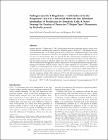| dc.contributor.author | MILLS, KINGSTON | |
| dc.date.accessioned | 2009-09-28T13:19:15Z | |
| dc.date.available | 2009-09-28T13:19:15Z | |
| dc.date.issued | 2002 | |
| dc.date.submitted | 2002 | en |
| dc.identifier.citation | Peter McGuirk, Chantelle McCann, and Kingston H.G. Mills `Pathogen-specific T Regulatory 1 Cells Induced in the Respiratory Tract by a Bacterial Molecule that Stimulates Interleukin 10 Production by Dendritic Cells: A Novel Strategy for Evasion of Protective T Helper Type 1 Responses by Bordetella pertussis? in Journal of Experimental Medicine, 195, (2), 2002, pp 221 - 231 | en |
| dc.identifier.other | Y | |
| dc.identifier.other | Y | en |
| dc.identifier.uri | http://hdl.handle.net/2262/33334 | |
| dc.description | PUBLISHED | en |
| dc.description.abstract | Antigen-specific T helper type 1 (Th1) cells mediate protective immunity against a range of infectious diseases, including that caused by Bordetella pertussis. Distinct T cell subtypes that secrete interleukin (IL)-10 or tumor growth factor (TGF)-? are considered to play a role in the maintenance of self-tolerance. However, the antigens recognized by these regulatory T cells in vivo have not been defined. Here we provide the first demonstration of pathogen-specific T regulatory type 1 (Tr1) cells at the clonal level and demonstrate that these cells are induced at a mucosal surface during an infection where local Th1 responses are suppressed. Tr1 clones specific for filamentous hemagglutinin (FHA) and pertactin were generated from the lungs of mice during acute infection with B. pertussis. The Tr1 clones expressed T1/ST2 and CC chemokine receptor 5, secreted high levels of IL-10, but not IL-4 or interferon (IFN)-, and suppressed Th1 responses against B. pertussis or an unrelated pathogen. Furthermore, FHA inhibited IL-12 and stimulated IL-10 production by dendritic cells (DCs), and these DCs directed naive T cells into the regulatory subtype. The induction of Tr1 cells after interaction of a pathogen-derived molecule with cells of the innate immune system represents a novel strategy exploited by an infectious pathogen to subvert protective immune responses in vivo. | en |
| dc.description.sponsorship | This work was supported by grants from The Wellcome Trust, the Health Research Board of Ireland, and Science Foundation Ireland. | en |
| dc.format.extent | 221 | en |
| dc.format.extent | 231 | en |
| dc.format.extent | 212928 bytes | |
| dc.format.mimetype | application/pdf | |
| dc.language.iso | en | en |
| dc.publisher | Rockefeller University Press | en |
| dc.relation.ispartofseries | Journal of Experimental Medicine | en |
| dc.relation.ispartofseries | 195 | en |
| dc.relation.ispartofseries | 2 | en |
| dc.rights | Y | en |
| dc.subject | CD4+ T cells ? bacterial infection ? mucosal immunity ? immunosuppression ? IL-12 | en |
| dc.title | Pathogen-specific T Regulatory 1 Cells Induced in the Respiratory Tract by a Bacterial Molecule that Stimulates Interleukin 10 Production by Dendritic Cells: A Novel Strategy for Evasion of Protective T Helper Type 1 Responses by Bordetella pertussis | en |
| dc.type | Journal Article | en |
| dc.contributor.sponsor | Health Research Board | |
| dc.contributor.sponsor | Wellcome Trust | |
| dc.contributor.sponsor | Science Foundation Ireland | |
| dc.type.supercollection | scholarly_publications | en |
| dc.type.supercollection | refereed_publications | en |
| dc.identifier.peoplefinderurl | http://people.tcd.ie/millsk | |
| dc.identifier.rssinternalid | 4909 | |
| dc.identifier.rssuri | http://dx.doi.org/10.1084/jem.20011288 | |




